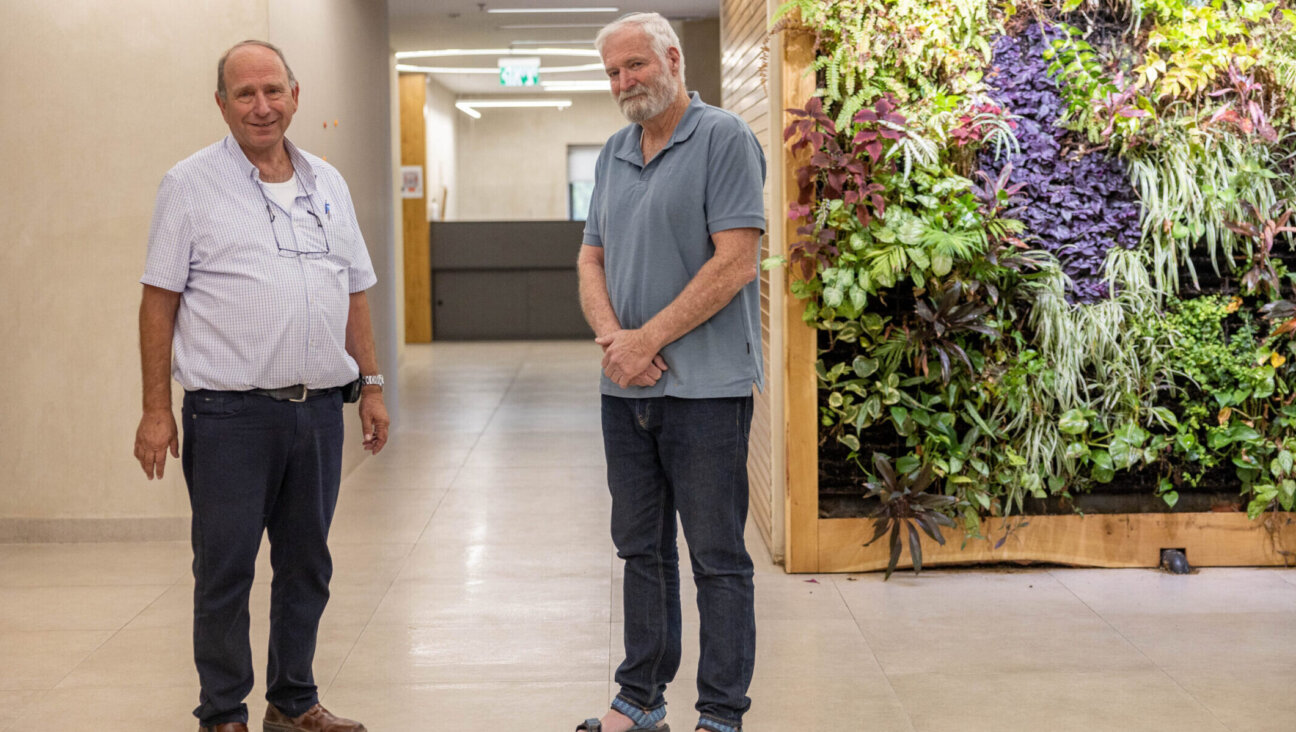Letter August 5, 2005
Berg the First Ballplayer To Be Big in Japan?
A July 29 article on the return of Gabe Kapler to the Boston Red Sox reports that Moe Berg is thought to have been the first Jewish ballplayer “to set up shop in Japan” (“Batter Back in Boston”).
Berg did play in Japan in the 1930s, but it was as part of a touring team of American all-stars playing exhibition games. Our forthcoming 2005 Update Edition of Jewish Major Leaguers baseball cards will reveal that the first known Jewish player to cast in his lot with a Japanese franchise was Richie Scheinblum, who played for — we’re not making this up — the Hiroshima Toyo Carp in 1975 and 1976. Scheinblum reports that he was the first player in the history of Japanese baseball to homer from each side of the plate in the same game.
The other Jewish player known to have played professionally in Japan is Micah Franklin, an outfielder with — once again, we are not making this up — the Nippon Ham Fighters.
Martin Abramowitz
President,
Jewish Major Leaguers
Boston, Mass.
David Solomon
Executive Director
American Jewish Historical Society
New York, N.Y.
Nixon Aide Malek Has Long Supported Israel
A July 22 article discusses Fred Malek’s service in the Nixon administration (“Former Nixon Aide ‘Pardoned’ by 2 Members of ‘Jewish Cabal’”). For many years, Malek has served as a member of the board of directors of the America-Israel Friendship League, of which I am chairman. He has been actively involved over the years and has distinguished himself in his support of Israel and in furtherance of strong and friendly American-Israeli relations.
Malek has shown himself to be a friend of the Jewish people, and he enjoys wide respect in the Jewish community. The dynamics involved in discharging his responsibilities when he served in the Nixon administration many years ago should not obscure the friendship and respect he has earned in the Jewish community through his activities and accomplishments since that time.
Kenneth Bialkin
New York, N.Y.
Consider Posthumous Organ Donation
The ethical issues surrounding the live donation of organs are indeed challenging and complex (“Live Donation of Organs Stirs a Debate Over Ethics,” July 29).
While the increase in the number of live organ donors is encouraging, the Forward does not discuss the very low donor rate among Jews when it comes to cadaveric donation of organs. Rabbinic law places supreme importance on saving another human being’s life. Yet there continues to be the false assumption among many Jews that organ donation after death is prohibited under rabbinic law, despite the fact that many respected Orthodox rabbis and legal decision-makers permit it — and even obligate one to become an organ donor.
Perhaps the inspirational stories of those who were willing to become live organ donors to save the lives of strangers will convince more Jews to at least register as organ donors so that more of the 89,000 individuals who are still waiting for organs can receive them.
Michael Feldstein
Member, Board of Directors
Halachic Organ Donor Society
New York, N.Y.
Save on School Tuition By Making Aliya
Here’s an alternative solution to those struggling with high day-school tuition costs in Lawrence, N.Y.: Move to Israel (“Long Island Proposal on Day Schools Draws Flak on Church-state Grounds,” July 29).
We moved to Bet Shemesh two years ago as “tuition refugees” from suburban New Jersey. Today we live in a house about half the size of our former one, and our household income is one-third of what it was. At the same time, our family budget has shrunk to one-third of what is was, thanks largely to tuition, property-tax and housing costs that are now just one-tenth of what they were.
Financially we are no better or worse off, but our kids are receiving a high-quality Jewish education, our quality of life is great, everyone is happy and it’s completely constitutional.
Eric Polly
Bet Shemesh, Israel
Pullout Foes Not Taught Respect for Democracy
I can only say “Amen” and “Yasher koach” to Rabbi Eric Yoffie’s July 29 opinion article on the “religious hooliganism” of some youthful Gaza disengagement opponents (“Disengage From Turning Religion Into a Political Slogan”). As someone who has lived, and at times worked, in the Modern Orthodox community in the United States, I think I can offer some insights as to the type of religious education that produces individuals who think that encouraging soldiers to mutiny and blocking up public transport are the hallmarks of Torah values.
Sadly it is all too simple. Too many Orthodox young people leave their high schools and advanced yeshivas without absorbing any respect for democratic institutions or the rule of law. What they do take away is a belief that their religious positions override the decisions of a democratically elected government because they are seen as divinely inspired and thus beyond the pale of any man-made sanction.
I’ve seen this play out in my own West Rogers Park neighborhood of Chicago. The Windy City has a long-standing ordinance banning any unauthorized signage on city property such as stop signs or lamp posts. Our local homeowners league has taken great pains to publicize this regulation and the possibility of ensuing fines for violators.
This hasn’t in any way impeded Chicagoland disengagement extremists from adorning these types of structures with their proverbial orange ribbons. And therein lies the very problem Yoffie has courageously exposed in his piece: Too many of our religious Jewish young people have grown up with the idea that they can freely impose their views on their neighbors and society as long as they are imbued with the trappings of a spiritual endorsement.
David Blatt
Chicago, Ill.
Conspiracy Theories Find Fertile Ground
I read with amused anxiety the July 22 article about another conspiracy theory involving Israel and the war on terrorism and in Iraq (“Times: Israeli Agents Are in Iraq… Maybe”).
I live in the small town of Eugene, Ore. It’s best described as “Berkeley without Jews.”
Here, conspiracy theories of how the Jews, the neoconservatives and the Mossad have cleverly joined together to convince President Bush to invade Iraq are commonplace. Walk into any health food store, and you find alternative “peace” folk discussing these Zionist conspiracies, along with articles in the local weekly of how the Israelis stole the land from the Palestinians.
When a well-educated guy such as Democratic National Committee Chair Howard Dean or Senator Edward Kennedy infers that somehow the United States had prior knowledge about the September 11, 2001, terrorist attacks, it makes sense around here that it was the Jews. When I challenged one of the intelligent workers at an alternative food store about such a conspiracy, he said that the Israelis and the Jews are very smart.
Regardless of how one feels about the peace process in the Middle East, or the war on terrorism, the next time someone or some newspaper brings up this so-called hidden agenda in New York or Washington, please tell them to just shut up because it causes basic antisemitic attitudes to be reinforced here in the flatlands.
Bob Kholos
Eugene, Ore.
Sinatra Fought for State With Seltzer, Charity
I very much enjoyed reading about the new book giving further detail to Frank Sinatra and his connection to the founding of Israel (“Sinatra Bio Explores Icon’s Jewish Connections,” July 15). As the Forward alludes, Sinatra indeed later starred as an American pilot fighting Arab tanks on behalf of the emerging State of Israel in the now famous scene from the film “Cast a Giant Shadow.”
What did he fight with? Seltzer bottles. In my current research about the history of seltzer, I recently spoke with the film’s writer and director, Melville Shavelson, about Sinatra’s role in the film, how seltzer bombs made it into Sinatra’s hands, and how he donated his salary to a center to build tolerance between Jewish and Arab youths. More information about these and other Sinatra items can be found in Shavelson’s hilarious book, “How To Make a Jewish Movie.”
Barry Joseph
Brooklyn, N.Y.
A message from our CEO & publisher Rachel Fishman Feddersen

I hope you appreciated this article. Before you go, I’d like to ask you to please support the Forward’s award-winning, nonprofit journalism during this critical time.
We’ve set a goal to raise $260,000 by December 31. That’s an ambitious goal, but one that will give us the resources we need to invest in the high quality news, opinion, analysis and cultural coverage that isn’t available anywhere else.
If you feel inspired to make an impact, now is the time to give something back. Join us as a member at your most generous level.
— Rachel Fishman Feddersen, Publisher and CEO























